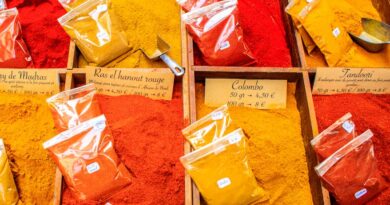Unlocking the Power of Food: How to Use Food as Medicine
Food has always been much more than mere sustenance. It is a source of joy, culture, and comfort. But beyond its role in satisfying hunger, food has the potential to heal and nourish our bodies in profound ways. In recent years, there has been a growing interest in using food as medicine, harnessing the power of nutrients to prevent and treat various ailments. From ancient traditions to modern science, the concept of food as medicine has a rich history and promising future. In this article, we will explore the fascinating world of food as medicine, delving into its principles, practices, and potential benefits.
The Historical Roots of Food as Medicine

Throughout history, different cultures have recognized the healing properties of certain foods and herbs. In ancient China, food was seen as an essential component of traditional medicine, with specific ingredients believed to balance the body’s energy and promote health. Similarly, Ayurveda, the traditional medicine system of India, emphasizes the importance of diet in maintaining well-being.
Even in ancient Greece, Hippocrates, known as the father of modern medicine, famously said, “Let food be thy medicine and medicine be thy food.” This philosophy highlights the interconnectedness of food and health, a concept that has stood the test of time.
The Science Behind Food as Medicine

Modern research has provided a wealth of evidence supporting the idea that food can indeed be a powerful form of medicine. Nutrients such as vitamins, minerals, antioxidants, and phytochemicals play crucial roles in maintaining our health and protecting against disease. For example, vitamin C is essential for a healthy immune system, while omega-3 fatty acids have anti-inflammatory properties that can benefit heart health.
Furthermore, certain foods have been shown to have specific health-promoting properties. For instance, turmeric, a spice commonly used in Indian cuisine, contains a compound called curcumin, which has potent anti-inflammatory and antioxidant effects. Similarly, garlic has been praised for its ability to lower blood pressure and cholesterol levels.
By understanding the nutritional content of foods and how they interact with our bodies, we can make informed choices that support our overall well-being. Whether it’s preventing chronic diseases or managing existing conditions, food can play a vital role in optimizing health.
Practical Tips for Using Food as Medicine

So how can you harness the healing power of food in your daily life? Here are some practical tips to help you get started:
1. Eat a Rainbow of Fruits and Vegetables
Fruits and vegetables are packed with essential vitamins, minerals, and antioxidants that support overall health. Aim to include a variety of colorful produce in your meals to ensure you’re getting a range of nutrients.
2. Choose Whole Foods Over Processed Foods
Whole foods, such as whole grains, legumes, nuts, and seeds, are more nutrient-dense than processed foods. Opt for whole, unprocessed ingredients whenever possible to maximize the health benefits of your diet.
3. Prioritize Plant-Based Proteins
Plant-based proteins, such as beans, lentils, tofu, and quinoa, are not only rich in protein but also contain fiber and antioxidants. Including more plant-based proteins in your diet can help reduce the risk of chronic diseases.
4. Incorporate Healing Herbs and Spices
Herbs and spices like ginger, cinnamon, and turmeric have been used for centuries for their medicinal properties. Experiment with adding these flavorful ingredients to your dishes to boost both the taste and health benefits of your meals.
5. Stay Hydrated with Herbal Teas and Infused Water
Hydration is essential for overall health, and herbal teas and infused water can provide additional health benefits. Try sipping on green tea for its antioxidant properties or infusing water with fresh herbs and fruits for a refreshing and nutritious drink.
The Role of Food in Preventative Medicine

Preventative medicine focuses on keeping individuals healthy and reducing the risk of developing diseases. Diet plays a crucial role in preventative medicine, as the foods we eat can either promote health or contribute to the development of chronic conditions.
By adopting a diet rich in whole, nutrient-dense foods, you can support your body’s natural defenses and reduce the likelihood of developing conditions like obesity, heart disease, diabetes, and certain types of cancer. Making informed food choices and prioritizing a balanced diet can be a powerful form of preventative medicine.
Food as Medicine in Modern Healthcare
While the concept of food as medicine has long been embraced in traditional healing practices, modern healthcare is also beginning to recognize the importance of nutrition in promoting health and well-being. Integrative medicine, which combines conventional healthcare with complementary and alternative therapies, often incorporates dietary interventions as part of a holistic treatment approach.
Doctors and healthcare providers are increasingly prescribing specific diets or nutritional supplements to address various health concerns, from managing chronic conditions to supporting recovery after surgery. This personalized approach to healthcare recognizes the unique nutritional needs of individuals and the potential for food to play a therapeutic role in treatment.
Common Misconceptions About Using Food as Medicine
Despite the growing interest in using food as medicine, there are still some common misconceptions that can hinder its effectiveness. One of the biggest misconceptions is that food alone can cure all ailments. While a healthy diet is essential for overall health, it is not a replacement for medical treatment when needed.
Another misconception is that all “natural” foods are automatically good for you. Just because a food is natural doesn’t mean it’s necessarily healthy or beneficial. It’s important to consider the overall nutrient content of foods and how they fit into a balanced diet.
Additionally, there is sometimes confusion around the role of supplements in using food as medicine. While certain supplements can be beneficial in addressing specific nutrient deficiencies, they should not be seen as a substitute for a well-rounded diet rich in whole foods.
Conclusion
Food is more than just fuel for our bodies; it is a powerful tool for promoting health, preventing disease, and enhancing overall well-being. By understanding the principles of using food as medicine and making informed dietary choices, we can take control of our health and optimize our quality of life.
Whether it’s incorporating healing herbs and spices into our meals, prioritizing whole, nutrient-dense foods, or adopting a plant-based diet, the possibilities for using food as medicine are endless. As we continue to explore the intersection of food and health, we unlock new ways to nourish our bodies and support our long-term wellness.
So, the next time you sit down to eat, consider the healing potential of your meal. Remember the wisdom of Hippocrates: let food be thy medicine, and let medicine be thy food.




